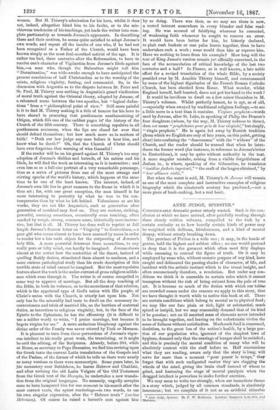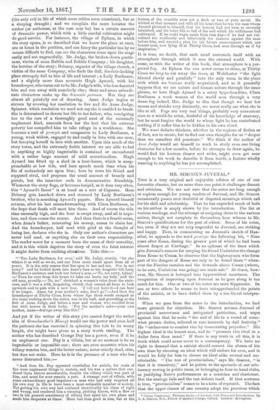ANNE JUDGE, SPINSTER.* CONSIDERABLE dramatic power utterly wasted. Such is
the con- clusion at which we have arrived, after painfully reading through these closely written volumes, compelled to the task by a certain curiosity as to how heavily certain kinds of power may be weighted with dullness, frivolousness, and a kind of mental dropsy, without utterly breaking down.
The province of Fiction is a wide one ; it may, in the hands of genius, hold the highest and noblest office ; no one would pretend to deny that it is the garment which often most fitly displays while assuming to conceal the figure of truth. Or it may be employed by some who, without esoteric purpose of any kind, have caught and delineated the passing shades of character, of life, and incident with the artistic instinct which is the truest insight, and often unconsciously therefore, a revelation. But under any con- ditions we think it is amenable to certain rules which it cannot transgress without the risk of being outcast from the pale of true art. It is because so much of the fiction with which our tables are crowded comes under the censure we apply to this story, that we have thought it worth while to notice this book at all. There are certain conditions which belong to mental as to physical food ; we may like our fare plain or rich, light or substantial, much spiced or insipid, but we may reasonably demand that of its kind it be genuine; not an ill assorted mass of elements never intended to be brought together, and leaving on the unfortunate victim the sense of fullness without satisfaction. Much such food is consumed, doubtless, to the great loss of the nation's health, by a large por- tion of our population who, ignorant of the simplest laws of hygiene, demand only that the cravings of hunger shall be satisfied ; and this is precisely the mental condition of many who will be absolutely content with the stuff before us. Half unconscious what they are reading, aware only that the story is long, will serve for more than a moment "pour passer le temps," they forget that with such undigested matter they are clogging the wheels of the mind, giving the brain chaff instead of wheat to grind, and hastening the stage of mental paralysis when the drugged intellect is powerless to make further exertion.
We may seem to write too strongly, when our immediate theme is a story which, judged by all common standards, is absolutely innocuous ; but we complain of it not as an artificial stimulus
• Anne judge,- Spinster. By F. W. Robinson. London : Sampson Low, Son, and
Marston. -
. (the only evil in life of which some critics seem conscious), but as a sleeping draught ; and we complain the more because the
author (or authoress, as the case may be) has a certain amount of dramatic power, which with a little careful cultivation might do good service. For instance, the village of Ilpham, in which the story opens, is so described that we know the place at once, are at home in the position, and can fancy the particular inn by no means difficult to find, can see the characters come upon the stage easily and not ungracefully. Mr. Judge, the broken-down gentle- man, victim of some Bubble and Bubble Company ; his daughter, the heroine of the story; Delaney, organist of the village church, a victim of the same Company, who finds the dull, desolate-looking
place strangely full to him of life and interest ; a Lady Burlinson, and a slightly more than eccentric Hugh Aynard, with his housekeeper, who turns out to be Mr. Judge's wife, who has deserted him and run away with somebody else ; these and some subordi- nate characters make up the dramatis persons. Bat they are almost all painfully out of drawing. Anne Judge begins at sixteen by avowing her resolution to live and die Anne Judge, Spinster, which resolution we need not say she is enabled to break. She is determined to devote her life to her father, who, consigning her to the care of a thoroughly good aunt of the extremely unpleasant kind, conceals from her the fact that his extreme poverty has compelled him to take refuge in a workhouse. She bacomes a sort of protegee and companion to Lady Harlingen, a
young, weak widow, engaged to and really in love with one man, but fancying herself in love with anothr. Upon this much of the story turns, and the extremely feeble interest we are able to feel in anything so highly improbable is sustained or encumbered with a rather large amount of mild sensationalism. Hugh Aynard has fitted up a shed in a boat-house, which is unap- proachable at low tide, and here spends much time when his fits of melancholy are upon him ; here he rows his friend and supposed rival, and proposes the usual amount of brandy and pistols, but the interview ends in demonstrative friendship. Whenever the story flags, or becomes insipid, as it does very often, this " Aynard's Roost" is at hand as a sort of Cayenne. Here Delaney gets knocked down and stunned by Lady Burlinsou's brother, who is searching Aynard's papers. Here Aynard himself returns, after his last misunderstanding with Clara Burlinson, in the hope that death will meet him there. And of course the tide rises unusually high, and the boat is swept away, and all is hope- less, and then comes the rescue. And then there is a frantic scene, when Anne's father, recovering his money, comes to claim her. And the housekeeper, half mad with grief at the thought of losing her, declares who she is. Only our author's characters are never half mad, or anything else on their own responsibility. The reader never for a moment loses the sense of their unreality, and it is this which deprives the story of even the faint interest it might derive from exciting situations. Take this :—
Yes, Lady Burlinson, for ever,' said Mr. Judge, sternly, for she wishes it as well as we do, and our lives must stand apart from all of yours. It is the only course that lies open to her and me. She is not sorry?' and he looked down into Anne's face as his daughter left Lady Burlinson's embrace and took her father's arm.—' No, not sorry, father.' =Then for ever from this house we take our leave, my lady,' said the old man, proudly.—' No, no!' shrieked a woman's voice from the stair- case, and it was a wild, despairing shriek, that caused all faces to look upwards and to pale with a new fear. '1 will not have it—I can bear it no longer. Anne, for your mother's sake, don't go !'—And then the housekeeper at Thirby Cross, from whose lips those words escaped as she came rushing down the stairs, was in the hall, and grovelling at the feet of Anne Judge, and before a man and woman who recoiled from her with horror in their looks. For the mother's sake—your own mother, Anne—don't go away like this !' " And yet if the writer of this story (we cannot forget the writer also of Grandmother's Money) would use the power and even half the patience she has exercised in spinning this tale to its weary length, she might have given us a story worth reading. The author who has described George Day has a power, even if it be an unpleasant one. Day is a villain, but at no moment is he an improbable or impossible one ; there are even moments when his villany wearies him, and the better nature, never utterly dead, stirs,
but does not wake. Here he is in the presence of a man who has never distrusted him ;—
" And then Dr. Day appeared crestfallen for awhile, for coals of fire were unpleasant things to sustain, and his was a nature that ren- dered them almost unendurable, despite the villany which was part of him, and must for ever remain a part. A strange sort of villain with some extraordinary good impulses—a man who had only required all his own way in life to have been a most estimable member of society. Not getting his own way had confused-inextricably his ideas of right and wrong, and rendered him a cunning, plotting knave, with a flaw or two in his general consistency of villany that upset his own plans and made him desperate at times. More bad than good in him, but at the bottom of the crucible oven yet a fleck or two of pure metal. He wished at that moment and with all his heart that he was the man whom Aynard pictured to himself, that his honour had not been so severely- tarnished, and his inner life so full of the evil which his selfishness had cultivated. If he could begin again from that day—if he had not cal- culated too studiously and laboriously the chances against the man before him, and weaved a plan for his future ensnarement which one honest man, now lying ill at Thirby Cross, had seen through as if by inspiration."
It is true, no doubt, that each mind surrounds itself with an atmosphere through which it sees the external world. With some, as with the writer of this book, that atmosphere is a per- petual fog. At Ilphana the sun never seems to shine, at Thirby Cross we long to cut away the trees, at Wolchester "the light- filtered slowly and painfully " into the only room in the place with which we become really acquainted, and as it generally happens that we see nature and human nature through the same glasses, so here Hugh Aynard is a misty hypochondriac, Clara Harlingen a weak woman of the world seen through a very dense fog indeed, Mrs. Judge so dim that though we hear her moans and shrieks very distinctly, we never really see what she is like at all. Fogs are very real things, probably very convenient ones to a would-be artist, doubtful of his knowledge of anatomy, but he must forgive the world to whose light he has contributed. nothing if it suffer him to be hidden in his own cloud.
We want definite thinkers, whether in the regions of fiction or of fact, not to create, but to find our own thoughts for us "deeper than we ourselves did penetrate." We think if the author of Anne Judge would set himself to work to study even one living character for a few months, before he attempts to draw again, he would find his horizon clearer and wider, might even get near enough to his work to describe it from inside, a feature wholly wanting to anything he has yet accomplished.



































 Previous page
Previous page